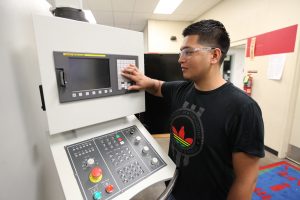Machining Technician
Mentor – Rick Huddleston

Rick is an instructor at Tulsa Tech’s Broken Arrow campus where his students can earn as many eleven different certifications in machining technology from the National Institute for Metal Working Skills (NIMS). Metalworking companies use the NIMS certifications as a basis for recruiting, hiring, placement and promotion. These include the four basic certifications needed for an entry-level job as a machinist and seven additional certifications for machining technicians who want to improve their job skills and pay.
Before becoming an instructor at Tulsa Tech, Rick began working in the trade immediately after he received his own initial training at a technical school much like Tulsa Tech. Rick’s career path demonstrates that becoming a machinist also offers the opportunity for advancement as he rose to the position of General Manager for several machine shops. Rick has made aircraft parts for the US Department of Defense including parts for F-15 and F-16 jet fighters, the B-1 Bomber and the Space Shuttle, as well as parts for oil field equipment manufacturers and companies like Caterpillar.
Besides teaching, Rick is active in a number of industry associations. He currently sits on the board of directors for the Tulsa Area Manufacturers Association, and was a liaison between the Oklahoma Alliance for Manufacturing Excellence and the Northeast Oklahoma Manufacturing Alliance. These organizations offer technical assistance and business advice to help manufacturing companies become more productive and profitable. He also works with the Statewide Automated Manufacturing Center, which is a model factory of the future with the latest computer-integrated equipment. The purpose of the Center is to help Oklahoma manufacturers develop high-tech production systems and to train workers in advanced manufacturing processes. Rick also helps his students find employment through his personal contacts in manufacturing and has been honored to award scholarships in his name to students at his hometown high school where he graduated.
In his article, Rick points out that computer numerical controlled (CNC) machines, which are a special computer-driven tool that machines a large variety of shapes, are becoming the standard. This means that a lot of the training you will need to become a machining technician involves learning basic computer programing skills. So while you will still be taught how to manually operate machines like mills and lathes, most of the work of a machinist now involves CNC program operation, fixture set-up, and CNC troubleshooting and maintenance, rather than manually using machine tools to manufacture parts. This automation has also produced a dramatic improvement in the safety of a machine shop.
There is currently a shortage of trained machinists that will continue for several years because the “Baby Boomers”, who now hold a high proportion of these jobs, are beginning to retire. Once you have five years of work experience and have added additional certifications, the pay you will receive can be better than most jobs requiring a four-year college degree. Plus, as Rick has shown in his own career, there is the opportunity to move into management and earn as much or more than a senior manager at the same company with an advanced business degree in fields like finance and accounting. Rick also points out that women are entering this trade and earning much more than would be possible in jobs traditionally occupied by women and that the pay is on par with careers like nursing, which require a more expensive four year college degrees. The cost of learning this trade is much lower that a four year degree because of the shorter training period and the number of scholarships and other kinds of financial aid available at Tulsa Tech, especially for those who get their training while they are in high school when the tuition is free.
Overview
I grew up in Northeastern Oklahoma in the small town of Coweta. My father was a tool and die maker, so I knew about the manufacturing trades. I decided in high school that I wanted to be a machinist and began taking classes at Indian Capital Technology Center in Muskogee. When I graduated, I got my first job in a local machine shop that manufactured aircraft parts for the DC-9 and DC-10, which were both twin engine, single aisle jetliners. But I wanted a better job and after a year I heard that Rockwell had received some new defense contracts and was hiring, nineteen of my friends and I went and applied. When it came time for the interview, I was the only one who dressed up and wore a tie and I was the only one of the group who was hired. That taught me early-on the importance of personal appearance when you go to a job interview.
The work at Rockwell was interesting. We were building the doors to the space shuttles and parts for the B-1 bomber. I worked eight years total between Rockwell and another defense contractor, McDonnell Douglas, where I got a security clearance and worked on projects like the F-15 and F-16 fighter aircrafts. One of the things I also enjoyed about this experience working for both defense contractors was the camaraderie among all the people in the shop. We got along well at work and after work we would hunt, fish and gather our families for regular cookouts.
I left McDonald Douglas after six years to take my first management job at a machine shop that was making archery sights and accessories. The company was losing money and to turn it around I helped get the shop compliant with the International Standard Organization. This allowed us to get a lot of new work and we diversified into oil field equipment and built parts for Caterpillar. Besides putting a greater volume of parts though the shop, being compliant let us raise our rates dramatically and sales went from $120,000/month to $1.2 million. I also worked with two other individuals from industry to develop new a new M.R.P. software that was later sold in four different countries. The experience also allowed me to make a lot of contacts with other machine shops in these industries. I left the company after 6 years.
The job I left involved a lot of travel, sometimes I was gone for as many as three weeks during a month. I had three young sons wanted to find something where I would be able to stay home and spend more time with them. While I was planning on taking off a couple months to think about what I wanted to do next, three weeks later I was approached by Tulsa Tech to become an instructor. I liked teaching and helping young people, but I wanted to be sure that this would be the right move for me. I decided time with my family was most important and wanted to give back to those that wanted to learn and lead our industry in the future. Machining, as well as many other manufacturing trades no longer have viable apprenticeship programs. The emphasis on automated manufacturing equipment like CNC machines means that becoming a machinist involves learning computer skills that cannot be easily taught in a machine shop, compared to the past when apprenticeship programs mostly involved learning how to manually operate equipment. This change in technology also makes it too expensive for most manufacturing companies to sponsor this computer training while paying someone as an apprentice, when they will not be productive for many months. As a result, technical schools like Tulsa Tech have evolved to provide a well-trained workforce to manufacturers and have become a real asset to both the student and the employer.
Previous to teaching in a lab and a classroom, I worked within Tulsa Tech’s Business and Industry Services (BIS) department, which is a division of the school district that provides customized corporate training services to regional businesses. BIS offers clients the opportunity to train their employees in a number of areas, including safety, efficiency, and procedural optimization to help companies and their employees be more effective and competitive in their marketplace. We would even be so convenient that we could train them on any one of our campuses, or on-site at their location, and honestly at pretty much any time of the day. I really enjoyed my ten years within the BIS department, and was a really effective way for me to network and engage industry with our students.
Machining has been a very rewarding career for me, both professionally and personally. I have always networked and use my business contacts to help my students find jobs and have been afforded the opportunity to award scholarships in my name to students at the same technical school where I graduated.
The Job of a Machining Technician
- A machining technician will normally use machine tools like CNC mills and lathes to make or modify parts that are most commonly made from metal or plastic feedstock. These machines operate different tools that cut away excess material from the stock fed into the machine, much as a woodcarver cuts away excess wood to produce his work.
- The cutting operations are designed to produce a part that conforms to a set of detailed specifications given to the machinist by the engineering department, such as blueprints and engineering drawings. These show each parts geometric dimensions and tolerances. A machinist then configures their machine tools and writes computer programs to control the operation of the CNC machines necessary to produce the part.
- The machinist also plans stock inventory by checking the amount available, anticipating the amount of stock that will be needed to produce the specified number of parts, placing orders for stock and then verifying receipt of stock.
- Although there are quality control departments in most machine shops, the machinist is the person primarily responsible for ensuring the specifications are maintained and the quality of the finished product.
- Machining technicians also maintain equipment by completing preventive maintenance, troubleshooting problems and calling for repairs. In large companies, there may be staff machinists on-site who also do maintenance to ensure continuous operations of the production machinery.
- Most importantly, the machinist is responsible for safe operations by adhering to safety procedures and regulations.
- Good machining technicians have strong conceptual skills, good judgment and pay attention to detail.
Tulsa Tech’s Machining Technician Program
This is a certification program where you are trained to be able to pass the four basic certification tests that will get you an entry-level job as a machining technician. Once you reach this first level, there are additional certifications you can earn that will translate into higher pay and let you have more responsibility in the shop.
These certifications require testing given by the National Institute for Metalworking Skills. Metalworking companies use the NIMS certifications as a basis for recruiting, hiring, placement and promotion. NIMS credentials are portable and will allow you get jobs in any NIMS certified shop.
The eleven certifications NIMS offers for CNC Machine Operators cover the following key skill areas:
- Measurement, Materials & Safety
- Job Planning, Bench work & Layout
- Manual Milling Skills I
- Turning Operations: Turning Between Centers
- Turning Operations: Turning Chucking Skills
- Grinding Skills I
- Drill Press Skills I
- CNC Turning: Programming Setup & Operations
- CNC Milling: Programming Setup & Operations
- CNC Turning: Operations
- CNC Milling: Operations
Tulsa Tech offers a variety of programs, typically beginning with students in their junior and senior years of high school. High school students attend tuition-free. Classes with Tulsa Tech sometimes can provide credits toward your high school graduation. It is possible to receive your four basic certifications for an entry-level job as a machining technician by the time you graduate from high school without paying tuition.
The full-time adult program typically takes nine months. Here are the basic courses you will take that will allow you to get your four initial certifications:
- Introduction to Machining
- Measurement Materials and Safety
- Job planning, Bench work and Layout
- Drill Press
- Turning
- Milling
- Grinding
- Workforce Staging
- CNC Basics
- Introduction to CNC Turning
- CNC Turning Programming
- CNC Turning Setups and Operations
- Introduction to CNC Milling
- CNC Milling Programming
- CNC Milling Setups and Operations
- Computer Aided Design and Machining
The estimated cost for tuition and lab is $4,200. But there are a number of scholarships and financial aid packages available from local and federal programs that can offset this cost. Check with Tulsa Tech’s financial aid office and they can give more information.
For those of you who cannot attend full-time, there are part-time programs available with classes in the evening or on weekends and where about 40% of the curriculum can be done online. We organized this remote learning program so that at different times of the day you will also have access to instructors who are available to answer your questions online on discussion boards and video chats. People taking classes part-time normally finish in about two years.
During this class students will learn the application of Algebra, Geometry, and Trigonometry. These are all math skills you need to use every day as a machinist. While it is beneficial to have an understanding of these math subjects ahead of time, Tulsa Tech instructors and academic specialists are capable and willing to help you along the way.
Many middle schools are now beginning Algebra in the 8th grade and you should start as early as you can to compete these classes. It is recommended that school age students should research their program of interest to determine a possible program of study at their home school to help them better prepare for Tulsa Tech.
Here are some photos of several of the classrooms and the equipment used to teach machining technology:
![IMG_1723[1]](https://ypng.co/wp-content/uploads/2016/05/IMG_17231-300x200.jpg)

Pay In Our Local Area
Pay for machinists in Eastern Oklahoma starts at between $30,000 and $40,000 per year for people with entry-level certifications. As you gain experience and add certifications, in five years you should be able to make around $30/hour and an annual salary of $60,000 to $70,000 a year working only limited overtime. If you have the opportunity to move into general management, your salary can be between $100,000 and $150,000 and many managers have the opportunity to get performance bonuses of 20% to 30%.
Summary
I have enjoyed my career as a machinist and appreciate the opportunities it has given me. I have three sons and two of them decided to go into this trade. I believe that the number of Baby Boomers now will keep the demand for new machining technicians strong for many years. There are also other opportunities if you choose this trade including pathways to management and the portability of the certifications that will let you move around the country if you choose. I have also found that I personally enjoy being an instructor and working with industry associations to help manufacturing companies. I also have enjoyed being part of the Business and Industry Services Department, where we work with other technical schools and colleges to introduce both students and local manufactures to the latest cutting edge manufacturing technology. Being a machining technician has been a good career choice for me and can be for you as well if you have the math skills and work ethic you need to succeed.






